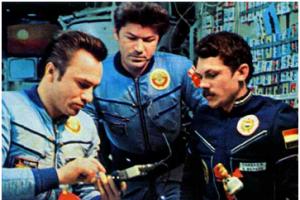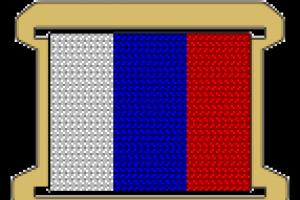1. Mark Antony came from a noble family; he was a relative of Caesar on his mother's side. The boy received a good education; According to his mentors, he was distinguished by an excellent memory and a sharp mind. He paid great attention to his physical form. After the death of his father, the future consul inherited huge debts. Mark Antony was forced to hide from creditors in Greece. Probably to solve financial problems, he married the daughter of a wealthy former slave (marriage to a girl from a noble family was impossible due to the young man’s reputation). After the death of his wife, Mark Antony entered into a second marriage - this time his chosen one was his cousin Antonia Hybrida. A few years later, the politician initiated a divorce, accusing his wife of treason. His third wife was the Roman matron Fulvia. He preferred Cleopatra to his fourth wife, Octavia. In addition, rumors about the politician's homosexual relationships were widespread in Rome. Cicero willingly distributed them; it was probably a matter of personal enmity.
Feast of Anthony and Cleopatra
2. Mark Antony became an ally of Caesar in 55−54 BC. e. With his help, he received the quaestorship, and a few years later, in turn, supported Caesar in the Senate. During his stay in Egypt, Caesar appointed him chief of the cavalry and entrusted him with the administration of Italy. It is known that Mark Antony was a brilliant orator, and this was one of the reasons for his popularity. In addition, Caesar valued him as a talented commander. The Allies won the election of consul in 44 BC. e. After Caesar's death, Mark Antony made a fiery speech, calling for the conspirators to be punished. In 42 BC. e. the commander defeated the forces of Brutus and Cassius.

Death of Anthony
3. The relationship between Mark Antony and Cleopatra was overgrown with a mass of fantastic details, but Plutarch’s testimony was also preserved: “She played dice with him, drank together, hunted together, was among the spectators when he practiced with weapons, and at night when he , in the dress of a slave, wandered and wandered around the city, stopping at the doors and windows of houses and showering his usual jokes on the owners - people of ordinary rank, Cleopatra was here next to Anthony, dressed to match him. Infatuated with the Egyptian queen, Mark Antony left state affairs; in addition, he transferred to the children of Cleopatra part of the lands intended for his children. The relationship lasted 10 years, while many in Rome were dissatisfied with the politician’s “adventure”. “What destroyed Mark Antony, a great man with noble inclinations, what led him to foreign morals and un-Roman vices, if not drunkenness and a passion for Cleopatra, not inferior to a passion for wine?” Seneca asked.
4. Octavian Augustus entered the fight against Caesar’s former ally. He started a war with Egypt, and on September 2, 31 BC. e. The opponents met at Cape Actium. Cleopatra was present on one of the ships during the battle; According to some reports, at the decisive moment she left the battlefield. Anthony's fleet, consisting of 220-360 ships, went over to the enemy's side. Octavian's crews were well prepared for a naval battle. Plutarch wrote: “Finally, close combat ensued, but there were no ram strikes or holes, because Antony’s cargo ships could not gain acceleration, on which the strength of the ram mainly depends, and Caesar’s [Octavian] ships not only avoided head-on collisions, fearing the impenetrable copper plating of the nose, but they did not dare to hit the sides, because the ram broke into pieces, bumping into thick, tetrahedral body beams, connected with iron staples. The fight was like a land battle, or, more precisely, like a battle near fortress walls.” Mark Antony fled with Cleopatra to Alexandria. He committed suicide on August 1, 30 BC. e.
(82-30 BC) ancient Roman politician and commander
All of my life Mark Antony strived to be like Caesar and even surpass him in all endeavors. However, according to many of Mark Antony’s contemporaries, he remained a pale shadow of Caesar: he sought sole power in Rome, but did not receive it; wanted to take a strong position in the East, but was defeated in the battle of Cape Actium; married Caesar's former mistress, the Egyptian queen Cleopatra, but was unable to retain the throne of Egypt.
The reason for Anthony's failures, as some historians believe, was his exorbitant vanity and inability to restrain his impetuous character.
Like other young men from noble Roman families, he held a prominent position in the army and served under Julius Caesar. Mark Antony managed to gain the popularity and love of the legionnaires, and this greatly helped him in difficult times. The soldiers perceived him as a worthy successor to Caesar. It is no coincidence that he represented his interests in Rome as commander of the cavalry and, therefore, deputy dictator. In '44 Mark Antony was elected consul.
After the assassination of Caesar, he vowed to deal with the murderers. During the funeral ceremony, Mark Antony addressed the citizens of Rome, urging them to oppose the murderers - Cassius and Brutus, and at the same time against the Roman aristocracy, which supported them.
Relying on the strength of the legions loyal to him, Mark Antony tried to become Caesar's official successor, took possession of his personal archive, gained access to the state treasury, and even implemented the laws prepared by Caesar.
However, his actions met resistance from part of the Roman aristocracy, who wanted to see Octavian, who later became Emperor Augustus, in his place. Antony's second formidable rival was Lepidus, Caesar's master of cavalry, who was proclaimed Pontifex Maximus (chief priest).
To avoid a clash with his rivals, Anthony had to enter into a triple alliance (triumvirate) with Octavian and Leidas. Thus began their joint reign in Rome and the fight against Caesar's murderers - Brutus and Cassius.
In 42, Mark Antony's troops defeated Caesar's assassins at Philippi. From that time on, he became the sole ruler of the rich Eastern provinces of the Roman Empire, moved to Alexandria, where he set up a luxurious court.
Despite the fact that from 40 BC. e. Mark Antony was married to Octavian's sister Octavia, and he openly became intimate with the Egyptian queen Cleopatra VII. Antony was madly in love with Cleopatra, but he was also attracted to her wealth and power. With their help, he dreamed of realizing his ambitious plans. In 36 BC. e. Mark Antony married Cleopatra, but from then on his failures began: in the same year he launched a campaign against the Parthians, which ended in the defeat of the Romans, and in 34 he lost the war with Armenia. This was followed by a final quarrel with Octavian, which led to a power struggle between them.
In 31 BC. e. Octavian's fleet defeated Antony near Cape Actium. After Octavian's troops entered Alexandria in 30, Antony and Cleopatra committed suicide. They did not want to follow the winner's chariot during his triumph. This story served as the basis for Shakespeare's dramas Julius Caesar and Antony and Cleopatra.
Ancient Rome existed for more than 1000 years. Throughout its development and throughout its history, it has been ruled by great people, and rulers of other famous countries are associated with it. Mark Antony is one of greatest people Roman Empire. He became a great commander who, among other things, won the heart of Cleopatra. History of Mark Antony, Interesting Facts it will be described in this article.
Childhood
Born in 82 BC. e. In some sources you can find the years 81 and 86, but most historians still agree on the first version. His family belonged to elite families. For more than one generation they made a significant contribution to the political life of Rome. The father, Praetor Atonius of Crete, left his son only debts after his death. In order to somehow pay off creditors, his son and mother decided to give away one of the estates. His mother, Julia, some time after the death of her husband, remarried Publius Cornelius Lentulus Sura.
In addition to Mark, there were two more sons in the family. All of them, together with little Anthony, showed great promise. Their teachers spoke of them as capable boys who could achieve a lot in life. Over time, the future commander received a good education, part of which was excellent physical training.
Youth
Despite the hopes of his teachers, Mark Antony, whose biography was described in detail by Plutarch, spent a far from enviable youth. He led a very dissolute and wasteful life, despite the fact that he had absolutely no means of subsistence. My father’s debts, and even subsequent ones, my own, accumulated at a tremendous speed.
Plutarch associates the most turbulent years of his life with the son of the consul, Gaius Curio. According to his sources, it was this man who encouraged him to drink a lot, date promiscuous women and not think about his future. Because of such a damaged reputation, Julia could not find a noble bride for her son. Therefore, for the first time he married the daughter of a freedman (free slave). True, the marriage did not last long due to the unexpected death of his wife. Mark Antony remained a widower and began to change his life.

Under the leadership of Caesar
Soon creditors began demanding their money. Mark Antony had no choice but to flee to Greece. There he not only took refuge, but also studied the humanities. Born to become a great warrior, not a scientist, he soon abandoned his studies and finally turned to military affairs. However, it is worth noting that the training was not in vain, and the oratory skills that he learned helped him more than once in the future. Very soon he became the commander of the cavalry and distinguished himself in campaigns against Aristobulus in Judea, and later helped Ptolemy XII Auletes ascend to the throne of Egypt.
From about 54 BC, Caesar and Mark Antony began to actively help each other, although even before that they got along well. The first assisted Mark in obtaining the quaestorship, and in 59 BC. e. Mark supported Caesar in the Senate. Julius Caesar helped Anthony win military laurels, and he gave him the opportunity to try himself in politics. After all, when the Civil War began, it was Mark who actually ruled Rome while Caesar was absent.
No wonder Julius Caesar's death angered him so much. Yes, the opportunity to take his place was attractive, but nevertheless, he wanted in every possible way to deal with those who killed his faithful comrade-in-arms. This is precisely what his great funeral speech speaks about (after all, they taught him well in Greece), which so heated up the crowd. A huge funeral bonfire was built for Caesar right in the square, and then the whole city rushed to look for the conspirators.

Power struggle
After Caesar's funeral, Mark decided to flee the country again so that he would not suffer the same fate. But then he returned and for a short time became the sole ruler, and even carried out several reforms. But Mark Antony's Rome did not last long - Antony Gaius Octavian appeared, and his sole rule came to an end. The fact is that shortly before his death, it was Octavian who Caesar prophesied as his heir, and this greatly undermined the influence of Mark Antony.
At first things went badly. Mark Antony lost in the Mutino War, Octavian was waiting for him in Rome, so the only thing left was negotiations. It was they who led to the formation of the second triumvirate, which included Mark Antony, Atony Gaius Octavian and Lepidus. They became the supreme rulers of Rome and divided its different parts among themselves. The first thing they did together was to eliminate Caesar's opponents and traitors - Brutus and Cassius. The people did not yet know how to react. After Caesar, they knew no other power, but revenge for the former ruler gave them hope.
In 42 BC. e. the triumvirate fell apart. Two comrades betrayed Lepidus and removed him from power, and they themselves divided Rome into western and eastern parts. The last one went to Mark Antony.

Cleopatra and Mark Antony
The love story of Cleopatra and Mark Antony began with her essentially ignoring him. Unlike other rulers, she did not show interest in him, which is what earned her attention. He didn't like it and called her to dinner. And when Cleopatra arrived to him, he was conquered at first sight. This is not a legend or fiction. Cleopatra was not very beautiful, but was famous for her ability to seduce men. She knew how to appear impressively, how to behave, what to say and do to be remembered. Therefore, Mark Antony's love is a reliable historical fact.
After they met, Mark Antony's life changed dramatically. The love of Mark Antony and Cleopatra was boundless. They indulged in lovemaking and had fun all day long. So, gradually, he forgot about his direct responsibilities.

War against the Roman Empire
No one would have said a word to Mark Antony, but his love for Cleopatra knew no bounds. He not only ignored responsibilities, but also distributed his property to her children. At the same time, Octavian began to realize the benefits of the situation. He gathered the Senate and spoke there against Mark Antony. In his speech, he criticized his actions as best he could. Most of all, the testament of the Roman leader had an impact on the Senate. In it, he asked to bury his body after death in Egypt, and appointed the child of Cleopatra and Caesar as his heir. This last straw had its effect and war was declared on Egypt.
If you analyze the actions of both sides, it becomes clear that Mark Antony and Cleopatra had a better chance of winning. But she was not a commander and did not know how to wage war, and he did not think through the strategy well. As a result, despite the army, which was both stronger and larger than the Roman one, they lost the battle.

Death
Mark Antony and Cleopatra held their last amazing feast. Everyone was having fun, eating, and indulging in lovemaking. But time passed relentlessly. In 30 BC. e. Octavian transgressed Alexandria, the queen detained him with messengers, and she locked herself in the bedroom. Mark was told that she had died, and he committed suicide. Cleopatra understood that she had two options - shackles or death. It was the latter that became the final choice. This is how the love of Mark Antony and Cleopatra ended.
Descendants
Mark Antony left behind 7 children. Each of them achieved a lot, but did not surpass their father in importance. It is believed that his distant relatives were also Mark Antony Aurelius and Gordian I. The latter erected the Mark Antony Amphitheater, which hosted terrifying games similar to those that took place in the Colosseum.

- Mark Antony invited Cleopatra to the first meeting more than once, but she refused him several times.
- Every famous Roman family, in one way or another, associated their surname with famous Roman gods or heroes. The same applies to the family of Mark Antony. According to legend, their family originated from the great Hercules, whose son was named Anton.
- In fact, it was Mark Antony who killed Cicero, but not directly - he ordered it to be done.
- Mark knew how to keep people under control. He “handled” the soldiers very well, perhaps due to the fact that he associated himself with Hercules. Some sources indicate that he really resembled the legendary hero both in appearance and in character.
- He was connected with Cleopatra not only by love, but also by law. In Egypt they officially got married, although in Rome the marriage was considered invalid.
(born c. 83 BC - died 30 BC)
Ancient Roman commander. In 43 BC. e. together with Octavian and Lepidus formed the 2nd triumvirate. He defeated the troops of Brutus and Cassius (42 BC) and gained control of the eastern regions of the Roman state.
Most people know Mark Antony thanks to his connection with the famous Queen of Egypt Cleopatra - the last representative of the glorious Ptolemaic dynasty. And few people know that Mark Antony was a talented commander, and at one time one of the most influential statesmen in Rome. But to rise to the level of his contemporaries Julius Caesar and Octavian Augustus, he lacked the ability to subordinate passions to political calculation and state interests.
Mark Antony was born in 83 BC. e. in an old aristocratic family, which had long taken part in political life and was well acquainted with all the ensuing consequences. Anthony's grandfather, an ardent supporter of Sulla, was killed by order of the consul Gaius Marius. The father received the nickname of Crete for conducting military operations in Crete, but did not possess his son’s military talents. The future commander's mother, Julia, was a relative of Julius Caesar, which likely contributed to his career.
At first there is nothing in young man did not foretell any special talents. Anthony, like many patricians, spent his youth in drunkenness and carousing, eventually fell into debt and was expelled from home by his father. The “Prodigal Son” sided with the people’s tribune Clodius, who, with his armed bands, ruled as he wanted in the People’s Assembly and the Forum. Anthony was impressed by such actions, consistent with his ardent character and desire to shock his elders - the stern patricians of the old school.
However, ambition soon began to appear in him. Anthony realized that in Rome, with his reputation, he could not achieve a high position, and went to Greece to study rhetoric in the hope that his former way of life would be forgotten over time. However, Anthony did not like painstaking studies. Soon he left them and entered military service with the Syrian consul Gabinius. The young warrior quickly won the sympathy of the soldiers, sharing with the legionnaires all the difficulties of camp life, not disdaining to eat from the same cauldron with them and generously distributing gifts.
Gabinius appointed Antony commander of the cavalry and sent him to suppress the uprising in Judea. Here the young patrician finally found his place. He immediately attracted attention with his personal courage and ability to command: during the siege of one of the cities, he was the first to climb the wall and carried the soldiers along with him; with a small detachment of legionnaires, he defeated a much more impressive enemy army.
After some time, Gabinius was sent to Egypt to help King Ptolemy XIII cope with the rebellious people. And here Anthony managed to prove himself with the most the best side. Going forward, he and his cavalry occupied the city of Jelusium, located at the mouth of the Nile, and then managed to bypass the enemy troops from the rear and defeat them. It was he who persuaded Ptolemy to show mercy to the vanquished and paid tribute to the leader of the rebels, Archelaus, who died in the last battle. Anthony ordered his body to be found and buried with honors. By this he attracted the sympathy of the Egyptians: during the time of Cleopatra there was no resistance to the presence of Anthony’s troops in Egypt.
Returning to Rome, Antony became close friends with Julius Caesar. He favored him, and after a military campaign in Gaul, he generously endowed the young commander with booty, making him rich. The name of Anthony in Rome had a new sound, and now nothing prevented him from engaging in political activities. His election as a tribune of the people allowed the military leader to launch energetic activities in support of Caesar. Therefore, when the future dictator was expelled from Rome by Pompey's supporters, Antony had to follow him.
However, Caesar soon returned with an army and captured Rome. And then Anthony significantly helped the dictator in the war with Pompey.
With a small army, Caesar crossed the sea to Macedonia, and Antony remained in Brundisium to transport the main forces. But the enemy fleet suddenly blocked the exit from the harbor. Then Anthony sent part of the army to Caesar by land, through Illyria, and put the remaining legionnaires on ships and, thanks to the swiftness of the actions, managed to break into the open sea, taking advantage of the enemy’s confusion. Thanks to this, Caesar received reinforcements at the decisive moment.
Many times in battles, Anthony saved the situation, inspiring the troops by his own example. Caesar highly appreciated the courage, courage and devotion of the military leader. Having received unlimited power in Rome, he made Anthony the sovereign ruler of Italy during his absence. And then the ruler returned to his old ways.
The carousing began. More than once Anthony was seen drunk on the streets of the city, in the theater or at parties in the company of actors, musicians and courtesans. From here it was not far to abuse of anger. The ruler refused to repay debts and pay for his purchases, sometimes quite significant. He was afraid of offending the interests of moneylenders, so he did his best to prevent the passage of a law on the abolition of debt obligations in the Senate. When its initiator Dolabella, a prominent supporter of Caesar's party, rebelled, Antony crushed the resistance in a bloody battle in the forum. Caesar, who returned to Rome, was very dissatisfied and removed his former favorite from himself. But Anthony again began to behave with dignity, and soon the dictator forgave him.
During the Ides of March, Caesar's assassins intended to deal with Anthony. He was saved only by the intercession of Decimus Brutus, who soon had to regret it.
After the death of Caesar, Antony was able to quickly seize the initiative. First of all, he went to the dictator’s wife, Calpurnia, and took her husband’s papers and cash from her. Then, convening a meeting of the Senate, Antony did everything to ensure that all the decisions made under Caesar were “confirmed. To gain time, Anthony secured an amnesty for the conspirators, but a few days later at the dictator’s funeral he shook Caesar’s bloody toga, calling on the Romans to take revenge. The crowd rushed to burn the houses of the deceased's opponents. The conspirators, including Brutus and Cassius, fled the city in fear.
For some time, Anthony occupied a dominant position in Rome. However, he had no shortage of rivals. A fierce struggle for power began, although Caesar in his will named his adopted great-nephew Gaius Octavian as heir.
Arriving in Rome, Octavian, despite his young age, immediately showed character. He demanded that Anthony return the money taken from Calpurnia. He refused and even insulted the heir. Then Octavian, who quickly advanced into the political field and became praetor of the Senate; led a fierce struggle against his adoptive father's former comrade-in-arms. In the battle of Mutina, Antony was defeated, but Octavian did not dare to pursue.
Together with the remnants of his army, Anthony made the most difficult transition through the Alps. The legionnaires suffered from fatigue, hunger and thirst. Along with them, Anthony also bravely endured the hardships of the campaign. Finally, the exhausted army managed to reach Gaul, where Lepidus was governor. Under his command were 7 legions that remained loyal to Caesar.
Dressed in mourning clothes, Antony went to Lepidus’s camp to the soldiers and won them over to his side. Lepidus had to conclude an alliance with Antony. By this time, Octavian had already become consul - the youngest ruler of Rome in the entire history of the city. Lepidus and Antony entered into an alliance with him, known as the “second triumvirate.”
Leaving Lepidus in charge of Rome and Italy, Antony and Octavian moved against Brutus and Cassius. In October 42, they defeated the army of Caesar's assassins in two battles at Philippi. The losers committed suicide, and Anthony, who remembered that Brutus had saved his life at one time, ordered him to be buried with great honors.
Now the commander who played decisive role in victory (Octavian was defeated by Brutus), became the most famous person in Rome. He received control of the richest Roman provinces in the East.
Having reached the heights of power, Anthony did not change at all. The commander indulged in pleasure with the same passion. He felt like the earthly embodiment of the god Dionysus, constantly surrounded by musicians, dancers, actors - hangers-on greedy for money. Anthony's generosity knew no bounds. He easily distributed privileges and freedoms to entire cities, without caring at all about the opinion of the Romans on this matter.
The governor felt like the uncrowned king of the East and, of course, sought to expand his influence. Among the eastern countries, he was especially attracted to Egypt, where Queen Cleopatra ruled, who must have made a great impression on him fifteen years ago during her stay in Rome.
Since the time of Caesar, the power of the queen has been maintained only thanks to Rome. During civil war she tried not to join either side, waiting for the outcome of the struggle. Under this pretext, Anthony sent one of his friends to Egypt demanding that he come for an explanation.
Cleopatra thought through her behavior to the smallest detail. To retain power, she needed to conquer the most powerful of the Romans at that moment. She arrived in the Cilician city of Tarsus on a luxurious ship with purple* sails and silver-bound oars. The queen herself reclined in a gilded tent dressed as Aphrodite. Boys with fans, dressed as erotes, stood around.
Anthony invited the queen to dinner, but she preferred to call him to her place, and the intrigued military leader obeyed. Completely fascinated by this legendary woman, he found himself in her power and thereby predetermined his fate. The queen subtly flattered her lover, calling him an emperor, a hunter “of cities, kingdoms and continents.”
First of all, with the help of Antony, Cleopatra eliminated her sister Arsinoe, whose rivalry she was afraid of. Then a series of continuous feasts and elaborate celebrations began. The queen was inexhaustible in her inventions. One of the most famous is the night visits to Alexandria. Cleopatra dressed as a maid, and Antony dressed as a slave. Together they made fun of the townspeople, and sometimes got into violent fights.
In the arms of Cleopatra, Anthony completely forgot about his duties. A sense of duty was clearly not one of his virtues. When in 41-40 BC. e. Rome fought the so-called Perusian War in the west of the empire, unleashed by his first wife Fulvia; the best of the Roman commanders chose to remain in Egypt, leaving Octavian to deal with the situation himself. But when the Parthians captured almost all of Western Asia, Anthony still had to return to Italy. In September 40 BC. e. he met with Octavian in Brundusium. Here they concluded an agreement according to which Octavian would rule the western part of the empire, and the entire east would go to Anthony.
In addition, to strengthen the alliance, Antony had to marry Octavian's sister, Octavia. The girl was beautiful and was known as one of the smartest women in Rome. For some time, she managed to turn her husband away from Cleopatra, who by that time already had two children from Anthony - Alexander Helios and Cleopatra Selene. However, this did not last long. At the end of 37 BC. e. the commander again went to the East to crush the Parthian kingdom. In the war with the Parthians, he hoped for help from Egypt. On the way, Anthony sent his wife to Italy, and, having landed in Syria, he immediately summoned Cleopatra to him and soon declared her his legal wife. As a wedding gift, the commander, without asking the opinion of his compatriots, presented her with territories belonging to Rome on the Phoenician coast, Fr. Cyprus, the coast of Cilicia, lands in Crete and Judea. True, he still did not send a letter to Octavia demanding a divorce.
However, the Parthian War ended in complete failure for the governor of the East. In the autumn of 31 BC. e. his troops suffered a catastrophic defeat at the walls of Gazaka-Vera in Media-Anthropatene. The main reason The catastrophe was the lack of siege engines stuck somewhere along the way. To save the army from complete defeat, Anthony had to lead the army along roads inaccessible to cavalry, high in the mountains. On the way, 24 thousand legionnaires and 4 thousand horsemen died from cold, hunger and skirmishes with the enemy. Anthony sent a report of victory to Rome. However, the true state of affairs soon became known there too.
The Romans were outraged by the behavior of their former idol. All attempts by Octavian to return his son-in-law to the family ended in failure. Severely offended, Octavian convinced himself and others that the governor, having contacted Cleopatra, had become an enemy of Rome. The basis for this was the will of Anthony, left with the Vestals. In it, he expressed a desire to be buried in Alexandria after his death, recognized his children from Cleopatra as legitimate, and most importantly, declared the queen’s eldest son, Caesarion, the legitimate son of Julius Caesar. Now even well-meaning compatriots believed that Anthony had been bewitched by Cleopatra and had lost his mind.
After Antony ordered Octavia and her children to leave his home in Rome, both sides began to prepare for war. According to contemporaries, Antony and Octavian “plunged their compatriots into the disasters of internecine war, one out of love for a woman, the other out of offended pride.”
According to Plutarch, Antony even followed Cleopatra’s lead in developing a war strategy. Instead of withdrawing his troops from Egyptian territory and giving battle in Macedonia, as many close associates advised, he, following the queen, insisted on the defense of Egypt.
Thus, the Egyptians were in an extremely disadvantageous position. It was necessary to defend from the sea a line stretching from Cyrene to Corcyra. As a result, the talented Roman naval commander M. Vipsanius Agrippa drove Antony's ships into the Actian Bay.
At the Battle of Actium, which took place on September 2, 31 BC. e., Antony had a significantly larger number of ships than Octavian. However, his heavy fortress ships were very clumsy. Therefore, the Roman fleet, distinguished by its great maneuverability, was in a more advantageous position. The Roman ships broke the enemy's oars and rammed their ships with sharp bows covered with copper sheathing.
The battle was still going on, but suddenly Cleopatra ordered sixty Egyptian ships to break through. The light sailing ships headed by the queen quickly coped with the task and began to move away towards the Peloponnese. Anthony left the flagship, boarded a pentera and rushed after it, leaving the remaining ships with 19 legions on board to the mercy of fate. He managed to catch up with the queen only at Cape Tenara, already in Greece.
Antony's abandoned comrades continued to fight all day until Octavian took his ships to the open sea. In the morning, he announced to his opponents about the betrayal of the commander. The legionnaires could not believe what had happened for a long time. They were deeply devoted to Anthony, the generous and courageous man who shared food and water with them. For seven days they waited for the commander to return, hoping that he would return with help, and then surrendered to Octavian.
In the spring of 30 BC. e. Octavian's troops simultaneously invaded Egypt from the east and west, and soon the Roman cavalry found itself under the walls of Alexandria. Here Antony won his last victory. Intoxicated with success, he presented the bravest of the warriors to the queen and awarded him golden armor. However, the very next day he ran over to the Romans. The legionnaires did not feel the same love for the military leader. And no one wanted to lay down their heads for Cleopatra. Shortly before this, 4 legions left the army, going over to the side of the enemy. A little later they were followed by cavalry, and with only infantry it was pointless to defend the city.
Residents of Alexandria were also ready to surrender the city. They were especially impressed by the rumor that Anthony had been abandoned by his patron god Dionysus. He was allegedly seen leaving the city gates towards the enemy camp.
At this time, Cleopatra locked herself in her tomb, having previously collected all her jewelry there. Soon rumors of her death spread throughout the palace. Anthony ordered the slave Eros to stab him. But Eros himself threw himself on the sword with the words: “The slave showed me how to die.” Antony also plunged the sword into himself, but was only seriously wounded. Having learned about this, Cleopatra ordered him to be taken to her on a stretcher, but refused to open the door. The unfortunate man had to be dragged into the tomb through the window. With the words that life had raised him to such a height that there was nothing to be sad about, Anthony died in the arms of the queen.
As for Cleopatra, despite all her precautions, the Romans managed to enter the tomb through the same window through which Antony was raised, and took the queen prisoner. She made an attempt to charm Octavian, but achieved nothing. When it became clear that he intended to lead her around Rome chained to a triumphal chariot, the queen ordered to be delivered to her secretly from the guards in a basket of fruit. poisonous snake and died from her bite. Egypt came into the possession of Octavian.
-------
* - The Romans associated the color purple with power.
Mark Antony(lat. Marcus Antoniu s, English Mark Anthony) (c. 83 - August 30 BC, Alexandria of Egypt) - Roman commander, politician, contender for the imperial throne, one of the key figures in Roman history in last years existence of the Republic. A descendant of a noble family, he was the son of the Roman admiral Antony Creticus and the noble patrician Julia. His father died when Antony was a boy, and he was raised by his adoptive father P. Cornelius Lentulus, who married Antony's mother. However, his adoptive father, involved in Catiline's conspiracy, was strangled by order, which revealed this conspiracy. Mark Antony never forgot about this. In his youth and young years, Mark Antony established himself as an insatiable womanizer and reveler. But even in the military field, he managed to prove himself as a brave and capable cavalry commander in the army of Gabinius in Egypt and Palestine. He later found himself in Gaul and served under the command of , becoming his personal friend, confidant and one of his best generals. During Caesar's participation in hostilities in Spain, Antony was in Rome and defended Caesar's interests by all means available to him. At the Battle of Pharsalus, in which Caesar defeated, Mark Antony commanded the left flank of Caesar's army. However, all of Antony's plans, which he built with the support of Caesar, collapsed on the day when Caesar was killed by the conspirators (March 15, 44). Anthony managed to seize Caesar's treasury and personal papers, he read out his last will and delivered a funeral speech, in every possible way presenting himself as Caesar's heir. However, he failed to seize power in Rome due to the resistance of the Senate and the true heir of Caesar. In November 43, a triple alliance - a triumvirate - was concluded to fight the army of Republicans who killed Caesar. The second triumvirate in Roman history was made up of Mark Antony, Octavian and Lepidus. The decisive battle took place in 42 at Phillipi in Greece, where the triumvirs won complete victory over the Republicans. Mark Antony became the ruler of the southeastern part of the Roman Empire. For some time, peace was established between the triumvirs; the cunning Octavian gave his sister in marriage to Antony, receiving in return control of Caesalpine Gaul. Meanwhile, Lepidus withdrew from the struggle for power and left the triumvirate. Mark Antony began a military campaign in the East, in Parthia, which was not very successful for himself. He showed that in general talent he was inferior in everything to his idol Caesar. This was understood in Rome and, most importantly, Octavian understood this. His stay in the East, although it supported Antony’s illusion of supreme power in Rome, completely relaxed him and turned his head; he became interested in the Egyptian queen, married her, gave her and his illegitimate children royal gifts, including territorial ones ( on the island of Crete and in Cilicia, in Asia Minor). In such conditions, it was not difficult for the calculating Octavian to present Antony as an ally of Rome’s sworn enemy, Queen Cleopatra. The final break with Octavian occurred in 33, when Antony divorced his wife Octavia. Anthony was deprived of power by the Senate of Rome, war was declared on Egypt and Queen Cleopatra (but not Anthony!). The decisive naval battle took place on September 2, 31, off Cape Actium (west coast of Greece). Despite Antony's personal courage and courage, as well as the determination, his fleet suffered a crushing defeat, and Cleopatra, at the height of the battle, gave her ships the command to return to Egypt. After this defeat, Antony also went to Egypt, and when Octavian's legions approached Alexandria, Mark Antony committed suicide. Queen Cleopatra, after Octavian's army entered the city, despite Octavian's order to protect the queen and prevent her death (he wanted to bring her to Rome as a trophy of war), committed suicide by allowing herself to be stung by a poisonous adder snake.








